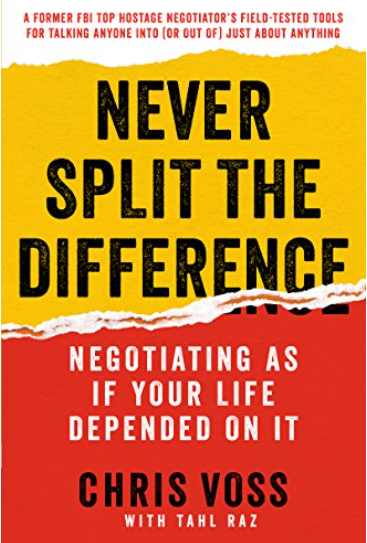
Here’s a new Bottom Line Book Summary for Never Split the Difference – Negotiating As If Your Life Depended On It by Chris Voss with Tahl Raz.
Why Read Never Split the Difference
Read this book if you breathe air. It’s that simple. If you’re human and you want to get along better with your family, friends, and even your crazy neighbor, read this book. If you want to get the best deal on your dream car or house, this book will position you to negotiate better terms and price. If you’re a business owner, manager, leader, salesperson, marketing professional, or interviewing for a new job, this book will help you relate better with people and negotiate better deals.
About the Author Chris Voss
Chris Voss is one of the best negotiators in the world. He’s the founder of The Black Swan Group, which is a consulting firm that trains and advises Fortune 500 companies in the art of negotiation. He teaches and lectures at leading American universities. His experience comes from working with the FBI as a leading negotiator and trainer; real world experience. Tahl Raz is the writer who helped Chris produce a phenomenal book.
Book Overview
The book is an engaging, story-based read with ten chapters and 263 pages, including the acknowledgements. Focus on extracting the process you can apply for your real-world and business needs.
Caution: Learning to apply any new communication, negotiation, or sales skill requires practice. Be careful to read the book more than once and role play the tactics you’ll learn in this book.
Bottom Line Takeaway Value
1. A Real-World Approach for Negotiating
Chris’s method for negotiating turns the prior body of work on its ear; Getting to Yes: Negotiating Agreement Without Giving In was a leading book based on research from Harvard University. As Chris reveals in his book, the prior premise presumed people negotiate rationally. You will learn through Chris’s many stories of negotiating with terrorists and bank robbers, humans decide based on emotion more than rational thinking.
2. Set Goals Before You Negotiate
Professionals know the value of training, coaching, role playing, and active visualization. Before you negotiate, see yourself getting what you want by applying the wisdom you learn from Chris’ process and approach.
3. Tactical Empathy
You’ll learn to understand and apply the power of putting yourself in the other person’s place. Chris uses the term tactical empathy throughout the book as a term to help you negotiate by understanding how and what the other person is feeling based on the situation and their personality type.
You’ll learn about key personality types including Assertive, Influencer, and Analytical/Compliant. You will become more self aware applying the skills you learn. Chris suggests using tactical empathy by seeing yourself in the mirror. Learn to pause and listen better.
4. Labels and Accusation Audits
Labels describe the pain or problem of the situation by using “accusation audits” which help you uncover what others want.
When used correctly, labels help you neutralize negatives and reinforce positives. You’ll learn to apply phrases such as “Looks like you value …”, “Feels like you don’t want …”, “Sounds like it would be easier if …”, “Seems like you’re reluctant to …”.
5. Calibrated Questions
Predetermine and practice using calibrated questions to help you identify value and overcome objections. Examples of calibrate questions include, “What are you looking to accomplish?”, “How is that worthwhile?”, “What’s the core issue here?”, “How does this affect things?”, “What’s the biggest challenge you face?”, and “How does this fit into your goal?”
When there are others involved in the decision-making process, you can use calibrated questions such as, “How does this affect the rest of your team?”, “How onboard are the people not here, on the call?”, and “What does your boss, team, partner see as their main challenge in this area?” Chris calls these “behind the table,” issues.
Other questions you can use to negotiate better include, “What does nothing cost you?”, “What happens if you do nothing?”, and “How does this deal resonate with what your company values most?”
6. Non-Cash Offers
Negotiating isn’t always about money. Non-cash offers can help you get to terms that mean as much or more than money. For example, you could negotiate for non-cash terms that benefit you. Negotiate for value beyond money that makes the deal worth doing. Then factor that into the overall deal you want.
7. Bend Reality
You’ll learn how to “bend reality” by using tactical empathy, mirroring your prospect, and asking calibrated questions. Chris describes how to use the “late night radio DJ (disc jockey) voice” when negotiations take a turn for the worse. For example, when you slow down your pace and use a deeper and softer voice, you can reposition yourself for better results.
Bending reality also happens when you use tactical empathy as intelligent questions such as, “Have you given up on this project?”, “Is this a bad time to talk?”, “What’s wrong with doing nothing?”, What would happen if you keep doing what you’re doing?”, “How can I help us both?”, “What did you want originally?”, “How am I supposed to do that?”
Always pause and listen for verbal and nonverbal cues. Pace is crucial.
8. That’s Right
The phrase Chris teaches you to strive for is, “That’s right.” It’s the cue that you’re on the right track and in the end, when the person with whom you’re negotiating uses these two words, you’ll know you’ve got a deal. Strive to extract the phrase three times without blowing your cover as an expert negotiator. Being authentic requires practicing your new skills.
Nobody who works for the FBI negotiates with terrorists or bank robbers without serious training, coaching, and practice. The top-performing professionals in every field practice better, longer, and harder to master their skills.
9. Clear Future
Clear future is a way to look ahead in the art of negotiation. Ask questions such as, “What happens next?”, “How will we know …?”, “How will we deal with …?” Help your prospect talk through, see, feel, hear what the future looks like.
10. Negotiating Is the Art of Communicating for Results
When you buy and read Never Split the Difference, you’ll take your ability to communicate with everyone to new levels. That will help you and others get along better, and the world will be a better place.
Bottom Line Book Benefits
- You will disarm people more than confronting them and putting others on the defensive.
- You will become more self aware and get along better with everyone.
- You will discover the primary personality traits for communicating better with others.
- You will learn tactical empathy and other techniques for getting what you want.
- You will be able to “clear the way” by getting the bad news on the table first.
- You will learn key phrases that have saved lives during hostage situations; extremely tense emotional scenarios which are far removed from the rational, logical mind.
- You will get people in everyday life to agree with you more.
Conclusion
Bottom Line Book Summaries extract the essential information you need to know to get better results in the business of life. Never Split the Difference is one of the best books on the market to help you negotiate like a professional.
One way to know if you’re becoming a better negotiator is to test your new skills with your spouse, life partner, children, and even the crazy neighbor who bothers you late at night. Never stop learning to master the art of communicating, negotiating, and helping others get what they and you want.
If you enjoyed my Bottom Line Book Summary, please buy and read the entire book by clicking here. Amazon pays me a small affiliate commission, which helps me write these summaries and save you time. You pay the same price when you use my affiliate link. Thanks.



